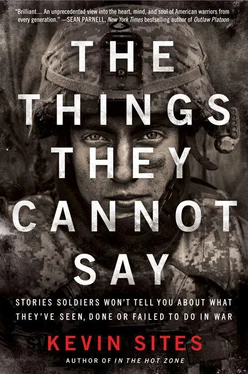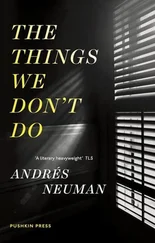There had been several battalions of NVA inside the city of Hue and when they were driven out by other units of Marines, Saal’s unit ran into retreating elements on a mountainside and they gave pursuit. “The objective was to get to the top,” Saal says, “and sweep down the mountain hoping to trap the NVA battalion against a Marine force coming up from the other side.”
Saal remembers pushing hard up the mountain, so hard that his radioman could barely keep up with him. It had been raining all day, and mud stuck to the treads of their boots and the rocks were slippery. When he reached the top, he found it had been cleared of bushes and shrubs. He wanted to get a better vantage point to catch a glimpse of the retreating NVA. Instead, when he reached for a rock outcrop as a handhold to pull himself up, he found himself floating through the air. The impact of his body falling against the rock face slammed him back into real time. One boot had been blown off and he was spurting blood from his hands and feet. He had tripped a notorious “bouncing betty,” a type of bounding mine, which, when triggered, launches three to four feet in the air, followed by a secondary blast propelling ball bearings at the individual unlucky enough to have triggered it and anyone in the immediate vicinity. It was left by the retreating NVA to slow down the advancing American troops.
“I remember what a mess it was,” Saal says. “I grew up Catholic so I started saying the Act of Contrition, apologizing to my parents, and I remember the corpsman [medic] talking to me as he was trying to bandage me up. ‘Lieutenant, you son of a bitch, you’re going home.’ I tried not to go into shock but I passed out. I woke up in a hospital in Da Nang after being medevac’d out.”
Saal spent the next two weeks unable to get out of bed. His injuries were serious and plentiful. He had shrapnel everywhere, but the worst damage was to his legs and feet, where large swaths of muscle were torn away. The fact that the hospital at Da Nang was shelled by the NVA nightly didn’t help his healing process. Saal said the mortar fire was often more terrifying than combat, since he couldn’t move and all he had for protection was a pillow a nurse gave him to cover up his body during the attacks. He was finally sent to Japan for more intensive surgery, where, he said, his injuries were met with even more insult.
Because of his transport time to Japan his bandages had not been changed for two weeks, and the blood and other fluids glued the gauze fibers into his wounds. He said one sadistic doctor chose to rip them off without giving him an anesthetic or even wetting them first to make them easier to remove.
He later recounted this experience too, in a short essay in his personal diary.
Stop, Stop. Please Stop
Behind the curtain separating the doctor, corpsman and soldier from the forty odd soldiers on the rest of the ward, the doctor states firmly and directly that the bandages have to be cut away from the soldier. In turn, the soldier asks for some Demerol. “Please, can you give me something for the pain? These bandages have been on me for two weeks and I know because of the dried blood that they are glued to my skin. I’ve gone through this process in DaNang once before and the doctor gave me Demerol and wet the bandages with warm water before taking them off.” With no emotion, the doctor replies, “No, I can’t do that. I’m in a hurry and this won’t take but a few minutes. You’ll be all right.” With that, the doctor begins pulling the adhesives from the soldier’s wounded right arm. “Oh, my God!” cries the soldier, “Then at least wet me down with warm water first!” “I don’t have time for that. There are other soldiers on this ward who need help. You are not the only one in my charge.” The doctor once again commences tearing at the taped right arm and this time the soldier screams louder. “Please, dear God! Stop, please stop! Goddamn it, please stop!” The corpsman tries to hold him down and this time the doctor pulls the tape from the soldier’s left arm. He tries to wrench himself free screaming louder and louder as the doctor pulls the tape from his chest, then begins to move on to the badly mangled and blood encrusted legs which are the receivers of the most damage from the explosion. “You fucker! You gotta stop! I can’t take this shit!” “Listen, you’re an officer! Now act like one! I expect you to behave in a more professional manner! There are enlisted men on this ward who can hear you! How do you think your screaming and cursing is going to affect their morale? Now stop your swearing and control yourself!” “I’ll stop cursing when you give me something for this pain.” “Oh, fuck, please stop!” screams the soldier as the doctor tears the tape along with the soldier’s skin from the left and then the right leg. “You fucking bastard!” “That’ll be enough, lieutenant! Just a little more—one last pull. There, that wasn’t so bad, was it?” The soldier is then taken from behind the curtain to his bed amongst the rest of the wounded where he passes out from exhaustion.
After his surgery in Japan, the Marines sent Saal back to the United States for more surgeries and to recuperate. To burn off the eight months he still owed the Marines following his recovery, Saal began teaching at the Marine lieutenants’ basic school in September of 1969. He would pick up a class of second lieutenants,” he said, “teach them, then watch them get shipped off to Vietnam and die.” (Democratic senator Jim Webb was one of his students.)
Despite what he’d gone through, Saal says he remained a staunch supporter of the war effort, so much so that after the Kent State shootings, Saal yelled at his brother, a Guardsman not involved in the shooting, “Why did they only kill four?” Over time, Saal says, his feelings evolved.
“I became totally antiwar,” says Saal, “but it was a process.”
Saal was discharged from the Marines two weeks after the Kent State shooting and actually became a student there himself. He had horrible nightmares about Vietnam but pushed through it and got a master’s degree in English. He threw everything away from his time in the war and resolved to never talk about it. For the next thirty-five years, he never did.
In fact, he pretended like it never happened. He got a job teaching English in his hometown of Akron, got married and eventually had four daughters. But the thoughts and memories of Vietnam never really went away. How could they when he believed that was the place where he lost his soul? Instead Saal just obscured his thoughts of Vietnam in a dense blanket of smoke that went on for decades.
“I was a pothead,” says Saal, which might be considered a huge understatement considering that toward the end of his addiction, he was lighting up nearly a pound of weed every month at a cost of $2,000. Ironically, Saal was getting $2,000 a month from the Marines in disability payments, using, in essence, the entire amount in an effort to forget or suppress everything that happened to him while he was in Vietnam. And though pot was his drug of choice, Saal said he would also sometimes binge-drink tequila or vodka on weekends when he needed to. Yet while he was, in his own words, chain-smoking joints up to five minutes before he entered the school during his final year of teaching, Saal was more than just fully functional; he was considered one of the hardest-working, most dedicated teachers at the school. He was active in the teacher’s union and graded papers until late into the night. And despite the injuries to his legs and feet, he took up running again, as he had in high school, running ten miles a day and even competing in half marathons. In between, he smoked dope and avoided his family—and his past.
Читать дальше












